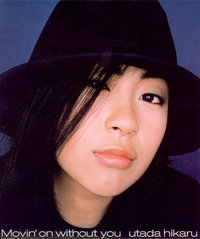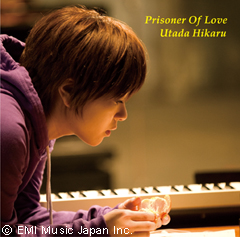
First Love is the debut Japanese-language studio album by Japanese-American recording artist Hikaru Utada, released on March 10, 1999, by Toshiba-EMI.

Deep River is the fourth studio album by Japanese-American singer Hikaru Utada. It was released via Toshiba EMI on June 19, 2002. The title of the album, as well as its title track, was inspired by the novel Deep River by Shusaku Endo. Utada wrote and co-produced the majority of the record, and unlike her previous album Distance (2001), she worked primarily with Japanese collaborator Akira Miyake and her father Teruzane Utada. Musically, Deep River is widely noted by fans and critics as the transition state from Utada's earlier style, R&B, to ethereal pop.

"Be My Last" is Hikaru Utada's 14th Japanese single, released on September 28, 2005. It was used for the 2005 film Spring Snow, an adaptation of the 1966 Yukio Mishima novel of the same name.

"First Love" is a song by the Japanese-American singer-songwriter Hikaru Utada. It was released on April 28, 1999, as the third Japanese language single from her second studio album, First Love, which was issued a month previously. It was certified double platinum for 800,000 copies shipped to stores in Japan.

"Movin' On Without You" is the second single by Japanese–American singer and producer Hikaru Utada. It serves as the second single from her debut studio album First Love (1999). The song was the first song that Utada had written and composed by herself. "Movin' On Without You" was incepted while Utada was attending high school in Tokyo, Japan, during 1997. Utada, who received a recording contract by Toshiba-EMI, had written an English-language version of the song, which remains unreleased to this day.

Ultra Blue is the sixth album by Japanese–American singer Hikaru Utada, released on June 14, 2006, by EMI Music Japan. It is the first original Japanese language album under Hikaru Utada's name in four years since her third album Deep River (2002). While the arrangements for her album Deep River were done collaboratively, all but one of the songs on Ultra Blue were written, composed, and arranged solely by Utada, who also did the programming herself.

The discography of Japanese-American R&B and pop singer Hikaru Utada consists of eleven studio albums, four compilation albums, eleven video albums and numerous singles and promotional singles. Utada began as a musician in the early 1990s as a member of U3, a family unit made up of her, her mother Junko Utada, also known as 1970s enka singer Keiko Fuji, and her father, musical producer Teruzane Utada. U3 released their debut album Star in 1993, with the hope to debut in America. In 1996, the group was rebranded as Cubic U, an R&B project focusing on Hikaru Utada, resulting in the English language album Precious in 1998 with record label Toshiba EMI.

"Final Distance" is a song by Japanese recording artist Hikaru Utada for her third studio album Deep River (2002). Written by Utada herself, the song was produced and composed by long-time collaborators Akira Miyake, Utada's father Teruzane Utada and herself. "Final Distance" was originally recorded as "Distance" which was taken from the album with the same name, despite not being a single. The song was re-recorded, re-arranged, and dedicated to Rena Yamashita, a six-year-old victim of the Osaka school massacre who had written an essay about being inspired by Utada.
"This Is Love" is Hikaru Utada's first Japanese digital single. It was released on May 31, 2006 as a promotional single for her fourth Japanese studio album. "This Is Love" was tied-in as the CM song for a Nissin cup noodle campaign and the opening theme for an anime "Freedom," which was also tied into the Nippon campaign. The digital single reached number one in virtually every online music store in Japan prior to the ULTRA BLUE album's release, including the most used store in Japan, iTunes Japan, as well as OnGen, among others. Utada herself is quoted to have said that this song is about expressing that "Love is like a mix of extremes: anxiety and peace."

"Boku wa Kuma" is a song by Japanese American singer-songwriter Hikaru Utada, serving as their 17th Japanese single and 24th single overall. The single was released on November 22, 2006, following the release of their previous studio album, Ultra Blue (2006). It came two months after the conclusion of Utada's United 2006 tour.

"Beautiful World" is a song by Japanese American musician Hikaru Utada. It served as the theme song for Evangelion: 1.0 You Are (Not) Alone, the 2007 film reboot of the anime Neon Genesis Evangelion. It was released as a double A-side single on August 29, 2007 along with her song "Kiss & Cry", which had been released digitally three months earlier. In 2009, a remix of the song, "Beautiful World " served as the theme song of the second film in the series, Evangelion: 2.0 You Can (Not) Advance.

Heart Station is the seventh studio and fifth Japanese-language album by Japanese–American recording artist Hikaru Utada. It was released on March 19, 2008, by EMI Music in Japan, and globally on March 26, 2008. It is Utada's eighth consecutive studio album to be fully written and produced by her, with the help of her father Teruzane Utada and long-time collaborator Miyake Akira through the production. Recorded between 2006 and 2008, it was worked on whilst she was recording her ninth studio and second English-language studio album, This Is the One (2009). With the album artwork photographed by Japanese photographer Mitsuo, Heart Station was released in two formats: a physical CD, and as a digital download.

"Prisoner of Love" is Hikaru Utada's 21st Japanese single and 30th single overall, released on May 21, 2008. This was her first Japanese recut single in nine years, after the first one "First Love" in 1999. It is also her first single to be released only in CD+DVD format. "Prisoner of Love" serves as the insert song for the Japanese television drama, Last Friends, while the original version is used in the opening theme. It won the Best Theme Song Award in the 57th Drama Academy Awards. "Prisoner of Love" was the 3rd most downloaded song in Japan during 2008.
"Eternally" is a song by Japanese musician Hikaru Utada, from their 2001 album Distance. It was re-arranged in 2008 as "Eternally (Drama Mix)" for use in the Maki Horikita starring Fuji TV drama Innocent Love. It was released as a digital single on October 31, 2008, and eventually released onto CD in March 2009, on an EMI compilation album I: Zutto, Zutto, Aishiteru (i(アイ)~ずっと、ずっと、愛してる~).

Utada Hikaru Single Collection Vol. 2 is Japanese pop singer-songwriter Hikaru Utada's second compilation album, released on November 24, 2010, by EMI Music Japan, the same day as her Universal-released English language compilation album, Utada the Best. The album includes two discs, with the first being a 13-track greatest hits album spanning 2004–2009, while the second is an extended play featuring new material. Along with Utada the Best, this remained Utada's last album release for six years, until 2016's Fantôme, due to an announced hiatus. Several of the new songs achieved commercial success, with "Goodbye Happiness" reaching number one on Billboard's Japan Hot 100 chart, and "Can't Wait 'Til Christmas" reaching number one on the Recording Industry Association of Japan's digital track chart. Both songs have been certified by the association as gold records for full-length cellphone downloads.

"Goodbye Happiness" is a song by Japanese American singer-songwriter Hikaru Utada. It was released as the lead track from Utada's second Japanese compilation album, Utada Hikaru Single Collection Vol. 2, in November 2010. The song was commercially successful, topping Billboard's Japan Hot 100 chart in December 2010, and in January 2011 was certified gold by the RIAJ for more than 100,000 full-length downloads to cellphones.
"Can't Wait 'Til Christmas" is a song by Japanese singer-songwriter Hikaru Utada. It was released on Utada's second Japanese compilation album, Utada Hikaru Single Collection Vol. 2, on November 24, 2010.

"Sakura Drops" is a song by Japanese-American musician Hikaru Utada. It was released as a double A-side single with the song "Letters" on May 9, 2002.

"Stay Gold" is a pop song by Japanese American musician Hikaru Utada. Used in a high-profile campaign for Kao Corporation's Asience shampoo commercials in 2007, the song was released as a double A-side single with Utada's song "Heart Station" on February 20, 2008.

"Hatsukoi" is a song by Japanese-American singer-songwriter Hikaru Utada. It is her fifth single under the label Epic Records Japan and was taken from her upcoming seventh Japanese-language studio album Hatsukoi. The song was released as a digital download on May 30 and was used as a tie-in for the Japanese television drama Hana Nochi Hare - Hanadan Next Season. It's the second song that Utada delivers to the series, after Flavor of Life in 2007.



















